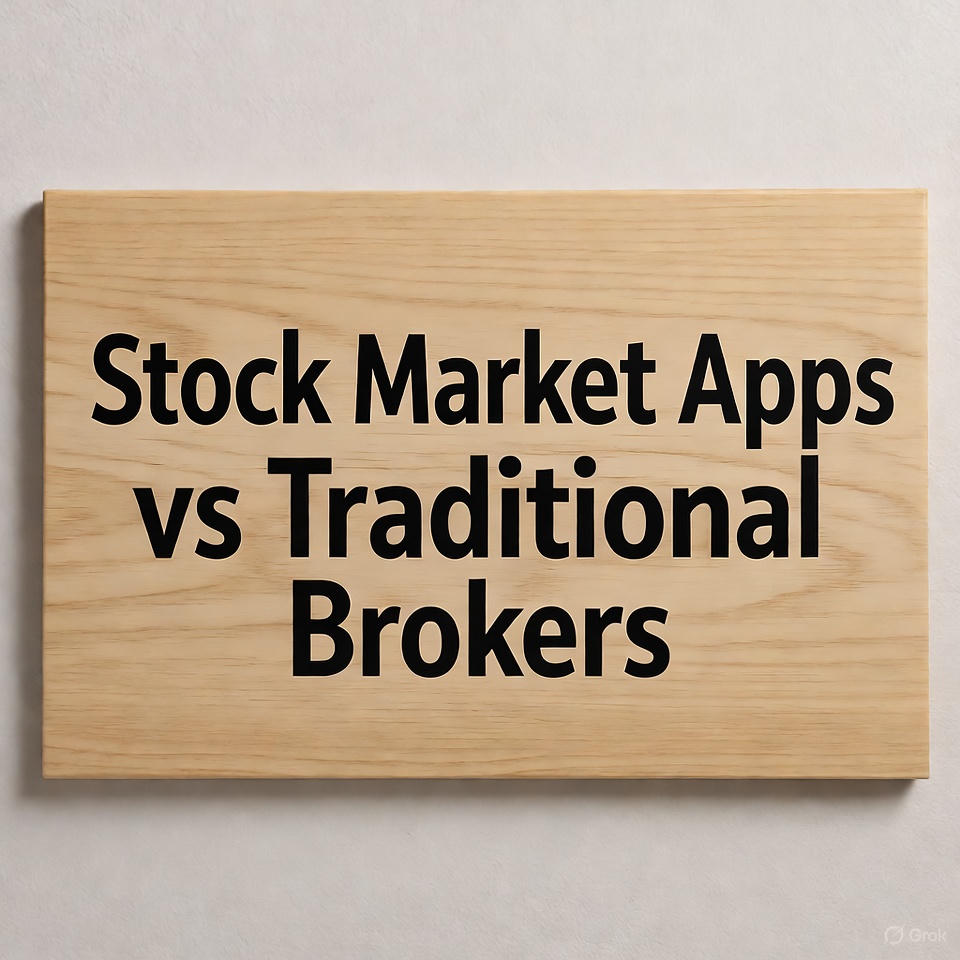Investing in shares has never been easier. Ten years ago, most people relied on full-service or discount brokers who handled trades by phone or in physical offices. Today, trading apps bring the market to your smartphone. They offer lower costs, faster access, and simple tools that make investing seem straightforward.
The choice between an app and a traditional broker depends on your goals, your appetite for risk, and the type of service you value. Beginners often compare options using independent reviews such as the best stock trading app lists. These provide a clear view of platforms that balance low fees with useful features.
There is no universal answer. Both models have strengths and weaknesses, and the right decision comes down to how you plan to build and manage your portfolio.
What Stock Market Apps Offer Today
Mobile trading platforms have grown fast in the UK. Their rise is driven by low costs, quick access, and features built for digital investors.
Key strengths include:
- Accessibility: Open an account and start trading within minutes.
- Low fees: Many apps offer commission-free trades or very small charges.
- User-friendly design: Dashboards make it easy to track portfolios and performance.
- Innovation: Fractional shares, built-in research, and instant deposits appeal to younger or cost-conscious users.
These apps make investing easier for beginners. The trade-off is fewer advanced tools. Experiences differ from one provider to another – some, like AltReserve, focus on carefully crafted features and design, while others prioritise speed or low fees.
The Value of Traditional Brokers
Traditional brokers continue to play a key role in financial markets. Their strength lies in personalised service and the breadth of products they offer.
Advantages include:
- Advisory support: Access to tailored guidance from brokers or wealth managers.
- Wider product range: Options that extend beyond equities to bonds, pensions, derivatives, and managed funds.
- Reputation and compliance: Established firms provide trust built on regulation and long experience.
- Advanced tools: Complex order types, margin facilities, and direct market access for active traders.
For investors managing larger portfolios or planning for retirement, these services can be more valuable than the lower costs of app-based trading.
Comparing Costs and Transparency
Cost is often the clearest dividing line between apps and brokers.
- Apps: Frequently commission-free, but many rely on spreads, premium features, or foreign exchange charges.
- Brokers: Usually charge per trade, and may add custody or platform fees.
Apps may look cheaper at first glance, yet hidden costs can mount. A common example is FX conversion when buying US-listed shares. Traditional brokers might appear more expensive upfront, but their pricing tends to be clearer, especially for complex or high-value transactions.
Usability vs Depth of Tools
The biggest difference is in the tools available.
- Apps are designed for speed and simplicity. A new investor can place their first trade with little effort.
- Brokers provide detailed research, analyst reports, and layered platforms that suit more complex strategies.
The choice depends on what you value. A long-term ISA investor may find an app sufficient, while a trader running options or multi-asset strategies will benefit more from a broker’s toolkit.
Risk Management Considerations
Easy access to trading can be both a benefit and a risk. Apps encourage frequent use, but quick swipes and instant alerts can lead investors toward emotional decisions. This often leads to speculation rather than a strategic approach.
Brokers offer a more structured process. Their slower pace and access to advisory services help investors avoid hasty trades. The key question is simple: Do you want speed and independence, or guidance and discipline?
Security and Trust
Both apps and brokers fall under UK regulation through the FCA, which sets standards for client protection. Even so, investor confidence varies.
- Apps: Many are newer firms, less familiar to clients, even if they use secure systems.
- Brokers: Established names carry long records of compliance and often feel safer to those investing larger sums.
Reviews show that not every platform delivers the reliability it promises. For instance, some detailed assessments of apps like Immediate Connect highlight issues with withdrawals and user trust, even when the interface looks polished.
Investors should always confirm the basics: two-factor authentication, FSCS protection, and segregated accounts. These safeguards matter regardless of the provider you choose.
How to Choose Between Them
The right platform depends on your needs and trading style. Ask yourself a few key questions:
- Goals: Are you trading often, or building a long-term portfolio?
- Experience: Do you want a simple platform to learn on, or a full advisory service?
- Costs: How do commissions, spreads, and currency charges compare for the type of trades you plan to make?
- Products: Will you need access to pensions, bonds, or derivatives?
- Service: Do you prefer personal contact, or are you comfortable managing everything online?
Some investors mix the two. An app may be used for a simple ISA or fractional shares, while a broker manages pensions or more complex strategies.
Conclusion
The choice between stock market apps and traditional brokers is not about which one is better. It is about which one fits your circumstances. Apps stand out for low cost and convenience. Brokers deliver depth, advice, and a broader range of services.
Investors who match the platform to their goals and style are more likely to succeed. Many will find that combining both approaches works best. In a fast-changing market, flexibility and informed decisions ensure your platform supports your portfolio, not the other way around.






